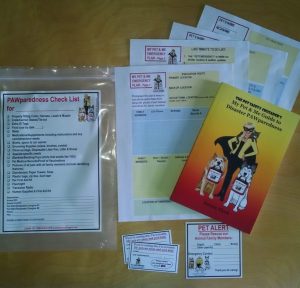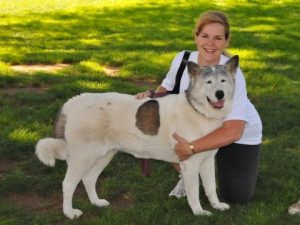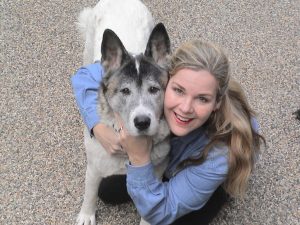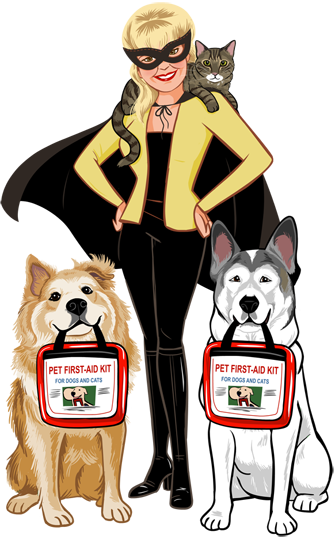The reason Flight Attendants request you put on your oxygen mask before assisting others is that you have less than 15 seconds before you lose consciousness! This applies to Pet Parents & Professionals as well. You must take care of your family first. Doing so keeps you safe and gives you peace of mind to leave your home and loved ones to offer aid to others. This means that your Disaster Preparedness Plan may need to be two-fold:
1) A Family Emergency Plan to get your household through whatever may come along,
and for professional pet sitters, rescue workers, etc…
2) A Business Emergency Plan to render aid to clients, but also…it is in your best interest to educate and encourage clients to create plans of their own. By doing so, they won’t drain your time and resources and should they need your help, they will have all necessary supplies to facilitate your efforts. Impress upon them the importance of selecting 1 or 2 designated caregivers ahead of you on their list as when a disaster strikes, you may have too many concurrent demands or may be physically unable to reach them due to mother nature’s wrath.

Write it down!
Write down both your family and business plans and include all family members (employees, volunteers, independent contractors) in the process. Be inclusive – do not do this in a bubble. Your youngest housemate or newest hire may think of something others have not, and you may find something was left out in the 2nd, 3rd or even 4th draft that should be implemented.
Be sure everyone, including your out-of-state contact, understands the details and has a copy on their cell phone including:
- Primary, secondary and out-of-town Meet-up Location
- Social Security, Medical & Contact Info for all
- Location & Phone where family/hires may be found (work, school, day/pet care)
- Supplies needed for pets & humans and where stashed.
- Plan to keep gas tanks half full for quick departure
- Money in small bills
- Vital Information on Pets
- Name & Phone of Out-of-State Contact
- Copies of Insurance Policies & Pertinent Documents
- Contact Numbers & Accounts for utility services, tree trimmer, HOA
- Written Directions to your home as memories fail in times of stress
- List of local News Radio stations
- Last-Minute To-do List



A current photo of your pet allows you to make a quick flyer should the animal go missing. Include pictures that capture colors, patterns and markings in your pet’s fur along with shots of all family members– proof that her or she is yours. Update as needed for frosted faces don’t longer look puppy pix, and remember to account for new additions.
- Vaccination records, medical history, diet, special hiding places as well as contact info for veterinarian, animal ER, groomer and 1st, 2nd & 3rd designated caregiver are musts. Have a list of pet friendly hotels that will accept your size, breed and number of pets, and make a reservation if you expect to evacuate. Ask other businesses if they will waive their “no pets” policy during times of crisis.
- Knowledge of Lost & Found websites is imperative.
Practice!
Going through the motions, as if it was the real thing, may save your pet’s life as well as other family members. Several times annually make everyone participate and practice rounding up each of the pets. It is vital that animals are part of the drill too so that they learn the routine. You can’t explain what to do, but you can teach them by doing! Desensitizing pets to wear muzzles, life preservers or stay in a carrier or seat belt can alleviate stress (theirs and yours) when you need their cooperation the most!
You can’t predict who will be home when it’s time to leave, so make sure everyone who might ever find themselves home alone can handle all animals. Ask clients to include you in their drills so you are familiar with how they have prepared their pets for evacuation.
Know Where to Go!
Most human shelters only accept service animals, so find out if your city plans to erect temporary animal shelters near human locations. Choose a primary meet-up spot, and have a Plan B in case the location is in the heart of the disaster. Your plan must take into consideration how you will meet-up if coming from various locations – reconnecting with kids who are at school or daycare, spouse at work, pets and/or elderly family members at home alone.
- A good out-of-town resource is https://www.ready.gov/plan-for-locations.
- Apartment dwellers, make sure pets are on record with building management, so that if you aren’t home, others know to assist your animals. If you live in a multi-level structure, condition dogs to walk up and down stairs as elevators may not be an option if power is out.
- Double check that invitation to stay with family/friends also include your pets.
- Are pets in carriers are allowed on MTA subways, buses and trains in your city? When an evacuation order is declared, larger animals may be allowed if properly muzzled and on a sturdy leash, so practice ahead!
Preparing for the worst may prevent the worst from happening!
A GRReat way to get a move on this and benefit from my READY REACT RECOVER system is to take my Pet Disaster Preparedness Certificate Course! Sign up here and get my book or pack, “The Pet Safety Crusader’s My Pet & Me Guide to Disaster PAWparedness” BEFORE you wish you had!
Denise Fleck is an award winning author and freelance writer. After extensive training, practice, more training and more practice, she developed her own Pet First-Aid & CPR curriculum and has been teaching animal life-saving skills for close to 20 years with many success stories to share. Additionally she developed a 5 month long Animal Care course for high school students in conjunction with the Burbank Unified School District and Animal Shelter. She has demonstrated animal life-saving skills on CBS –TV’s “The Doctors,” Animal Planet’s “Pit Boss,” “Kirstie Alley’s Big Life” and countless other shows. To complement her teachings, Denise created a line of Pet First-Aid Kits, posters and books for children teaching animal respect and care! Visit www.PetSafetyCrusader.com or call (818) 951-7962.
Note: The articles on this page are copyrighted. Please do not reprint or use portions for any purpose without written permission from the author. Request permission for usage by sending an email explaining how you’d like to use the materials and what parts specifically. Thank you in advance!








